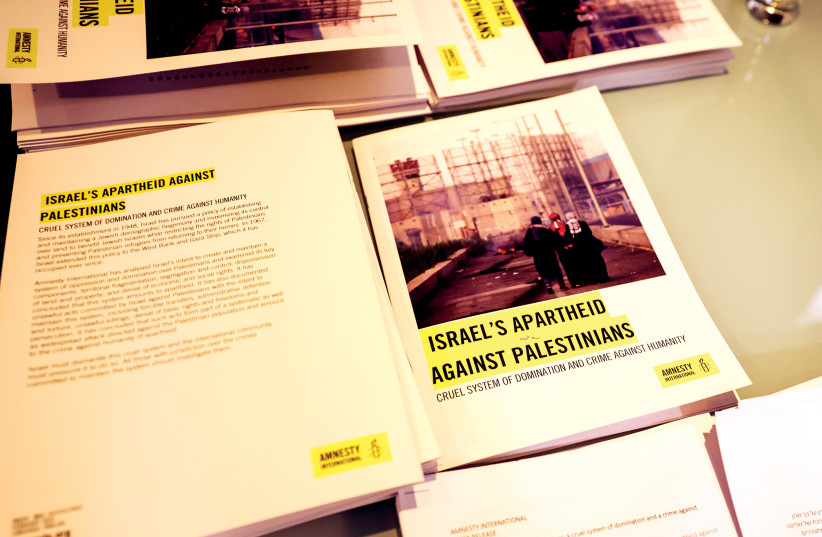In 1600, Anglican bishop and philosopher George Berkeley is said to have posed the following question: “If a tree falls in a forest and no one is around to hear it, does it make a sound?”
Berkeley’s challenge has not yielded a definitive answer. But it does more: It reveals the tension between reality and perception.
All this is by way of a prelude to a question I had been struggling with for many years. For a long time in academia, I wondered: Where are the Zionist scholarly voices? If I exist, surely there must be others. But I could hardly locate them.
I heard of a few closeted Zionists, but when I tried to speak to them at conferences, they would either cast down their eyes, swiftly change subjects, or apologize profusely for their inability to meet over coffee.
Another time, a friend in academia said, “listen, I agree with you totally, but you will have a better chance if you change your name, come up with a pen name for yourself, and then you can write all you want and it won’t come at a cost to your career.”

I was a very junior scholar, and I knew that I was taking a huge risk by “putting my Zionist self out there.”
Anyone in marketing will tell you, it’s not about the numbers, it’s about who’s the loudest. And the voices from within academia that demonize and defame Zionism are, indeed, pretty loud. The tragedy is that many of these voices come from within the Jewish and Israel studies fields.
With hubris these Jewish studies professors compose letters that condemn Israel, assuming incorrectly that an entire chorus of like-minded scholars chant their refrain.
If an alien were to drop to Earth from outer space and listen to the noise made by these professors on the topic of Israel, Zionism and antisemitism, the alien would return with a biased and incorrect assessment of people who have made Jewish history, literature and culture their professional world.
But no one wants to hear a monologue. And let’s not forget that universities, once upon a time, fostered freedom of thought and expression. And so in June of 2022, 10 years since one of the first letters drafted by Jewish studies faculty from the University of California campuses, a new group emerged, disrupting this monologue.
What is the Jewish Studies Zionist Network?
The Jewish Studies Zionist Network is a rapidly growing network of academics and scholars from within the field of Jewish studies and/or Israel studies. These are both junior and tenured professors who decided to make noise, and make they did.
In their mission statement, the founding committee members wrote that JSZN “is an association for scholars and educators within Jewish studies, Israel studies and adjacent fields who are tired of the imbalanced nature of academic discussion in higher education surrounding Israel.”
Within less than a year, they have collected close to 200 signatures on letters that express loudly and boldly that Zionism is integral to Jewish identity and that anti-Zionism is antisemitism, if not in intent then most certainly in effect.
Their most recent endeavor, to urge the United Nations to adopt the IHRA working definition of antisemitism, garnered 150 signatures from academics around the world, some of whom are illustrious thought leaders and academics, such as Dr. Einat Wilf, Dr. Yoram Hazony, Dr. Jeffrey Herf and Dr. Gil Troy.
In anticipation of the new year, the committee came together to award the annual Schmegegge Award to Peter Beinart, who in Jewish Currents wrote, “It is time for liberal Zionists to abandon the goal of Jewish-Palestinian separation and embrace the goal of Jewish-Palestinian equality. This doesn’t require abandoning Zionism.”
What is essential here is that to the outside, predominately non-Jewish world, Jews with lofty titles before their names carry weight. It is a no-brainer, therefore, that in their attempt to defame Zionism, Israel and the Jewish people, the United Nations or Amnesty International will most certainly make use of a letter commissioned by Jewish studies scholars.
Well, now they can’t so easily weaponize Jewish scholars, because hinenu, we are here.
The writer is a scholar of contemporary antisemitism and works with the Jewish community to bring pride and robust education on the history of the Jewish people and the Arab-Israeli conflict. She holds a PhD from UCLA, where she wrote about Holocaust literature in the Soviet Union, where she was born.
